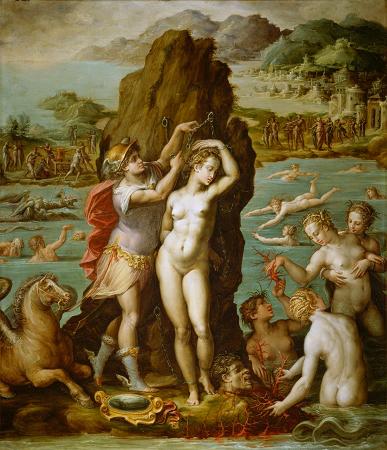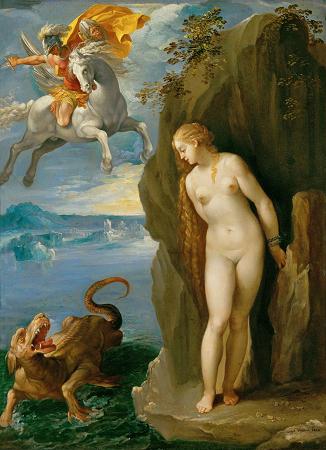Perseus. Perseus is a hero in Greek mythology, best known for slaying the Gorgon Medusa and rescuing the princess Andromeda from a sea monster. In art, Perseus is often depicted as a symbol of courage, strength, and heroism. Perseus is typically depicted as a strong, athletic, and handsome young man, reflecting his status as a legendary hero. He may be shown wearing armor, a cloak, or other attire befitting a hero of his stature. One of the most iconic attributes of Perseus is the severed head of Medusa, which he used to turn his enemies to stone. In art, Perseus is often shown holding Medusa's head aloft, either as a trophy or as a weapon against his foes. Sometimes he is shown with the legendary weapons and tools he used to complete his quest, such as the winged sandals, the cap of invisibility, and the curved sword or harpe. Another popular scene is his confrontation with Medusa, the fearsome Gorgon whose gaze could turn men to stone. This scene may be depicted with Perseus using his reflective shield to avoid Medusa's petrifying gaze while he beheads her. Another famous episode from the myth of Perseus is his rescue of the princess Andromeda, who was chained to a rock as a sacrifice to a sea monster. In art, this may be depicted as a heroic moment, with Perseus swooping in to save Andromeda just as the monster is about to devour her. Because of the obscurity of the name Perseus and the legendary character of its bearer, most etymologists presume that it might be pre-Greek; however, the name of Perseus' native city was Greek and so were the names of his wife and relatives. There is some idea that it descended into Greek from the Proto-Indo-European language. In that regard Robert Graves has proposed the only Greek derivation available. Perseus might be from the Greek verb some form of which appears in Homeric epithets. Herodotus recounts this story, devising a foreign son, Perses, from whom the Persians took the name. Apparently also the Persians knew the story, as Xerxes tried to use it to bribe the Argives during his invasion of Greece, but ultimately failed to do so. Perseus was the son of Zeus and Danae, the daughter of Acrisius, King of Argos. Disappointed by his lack of luck in having a son, Acrisius consulted the oracle at Delphi, who warned him that he would one day be killed by his daughter's son. In order to keep Danae childless, Acrisius imprisoned her in a bronze chamber, open to the sky, in the courtyard of his palace: This mytheme is also connected to Ares, Oenopion, Eurystheus, and others. Zeus came to her in the form of a shower of gold, and impregnated her. Soon after, their child was born; Perseus, Perseus Eurymedon, for his mother gave him this name as well. Fearful for his future, but unwilling to provoke the wrath of the gods by killing the offspring of Zeus and his daughter, Acrisius cast the two into the sea in a wooden chest. Danae's fearful prayer, made while afloat in the darkness, has been expressed by the poet Simonides of Ceos. Mother and child washed ashore on the island of Seriphos, where they were taken in by the fisherman Dictys, who raised the boy to manhood. The brother of Dictys was Polydectes, the king of the island. When Perseus was grown, Polydectes came to fall in love with the beautiful Danae. Perseus believed Polydectes was less than honourable, and protected his mother from him; then Polydectes plotted to send Perseus away in disgrace. He held a large banquet where each guest was expected to bring a gift. Polydectes requested that the guests bring horses, under the pretense that he was collecting contributions for the hand of Hippodamia, daughter of Oinomaos. Perseus had no horse to give, so he asked Polydectes to name the gift; he would not refuse it. Polydectes held Perseus to his rash promise and demanded the head of the only mortal Gorgon, Medusa, whose gaze turned people to stone. Ovid's account of Medusa's mortality tells that she had once been a woman, vain of her beautiful hair.
more...














